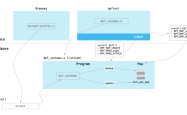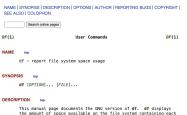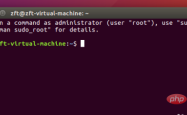linux 命名管道实例详解
linux进程间通信——命名管道
fifo(命名管道)不同于匿名管道之处在于它提供⼀个路径名与之关联,以fifo的⽂件形式存储于⽂件系统中。命名管道是⼀个设备⽂件,因此,即使进程与创建fifo的进程不存在亲缘关系,只要可以访问该路径,就能够通过fifo相互通信。值得注意的是,fifo(first input first output)总是按照先进先出的原则⼯作,第⼀个被写⼊的数据将⾸先从管道中读出。
创建命名管道的系统函数有两个:mknod和mkfifo。两个函数均定义在头⽂件sys/stat.h,函数原型如下:
?| 1 2 3 4 | #include <sys/types.h> #include <sys/stat.h> int mknod( const char *path,mode_t mod,dev_t dev); int mkfifo( const char *path,mode_t mode); |
函数mknod参数中path为创建的命名管道的全路径名:mod为创建的命名管道的模式,指明其存取权限;dev为设备值,该值取决于⽂件创建的种类,它只在创建设备⽂件时才会⽤到。这两个函数调⽤成功都返回0,失败都返回-1。下⾯使⽤mknod函数创建了⼀个命名管道:
?| 1 2 3 4 5 6 7 8 9 10 11 | umask(0); if (mknod( "/tmp/fifo" ,s_ififo | 0666) == -1) { perror ( "mkfifo error" ); exit (1); } |
函数mkfifo前两个参数的含义和mknod相同。下⾯是使⽤mkfifo的⽰例代码:
?| 1 2 3 4 5 6 7 8 9 10 11 12 | umask(0); if (mkfifo( "/tmp/fifo" ,s_ififo|0666) == -1) { perror ( "mkfifo error!" ); exit (1); } |
下面为一个试例:
read端
?| 1 2 3 4 5 6 7 8 9 10 11 12 13 14 15 16 17 18 19 20 21 22 23 24 25 26 27 28 29 30 31 32 33 34 35 36 37 38 39 40 41 42 43 44 45 46 | #include<stdlib.h> #include<stdio.h> #include<sys/types.h> #include<sys/stat.h> #include<fcntl.h> #include<errno.h> #define path "./fifo" #define size 128 int main() { umask(0); if (mkfifo (path,0666|s_ififo) == -1) { perror ( "mkefifo error" ); exit (0); } int fd = open (path,o_rdonly); if (fd<0) { printf ( "open fd is error\n" ); return 0; } char buf[size]; while (1){ ssize_t s = read(fd,buf, sizeof (buf)); if (s<0) { perror ( "read error" ); exit (1); } else if (s == 0) { printf ( "client quit! i shoud quit!\n" ); break ; } else { buf[s] = '\0' ; printf ( "client# %s " ,buf); fflush (stdout); } } close (fd); return 3; } |
下面为weite端:
?| 1 2 3 4 5 6 7 8 9 10 11 12 13 14 15 16 17 18 19 20 21 22 23 24 25 26 27 28 29 30 31 32 33 34 35 36 37 38 39 40 41 42 43 | #include<stdlib.h> #include<stdio.h> #include<unistd.h> #include<sys/types.h> #include<sys/stat.h> #include<string.h> #include<errno.h> #include<fcntl.h> #define path "./fifo" #define size 128 int main() { int fd = open(path,o_wronly); if (fd < 0) { perror ( "open error" ); exit (0); } char buf[size]; while (1) { printf ( "please enter#:" ); fflush (stdout); ssize_t s = read(0,buf, sizeof (buf)); if (s<0) { perror ( "read is failed" ); exit (1); } else if (s==0) { printf ( "read is closed!" ); return 1; } else { buf[s]= '\0' ; write(fd,buf, strlen (buf)); } } return 0; } |
打开两个终端:
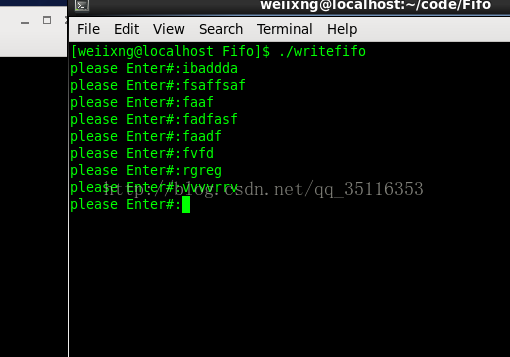
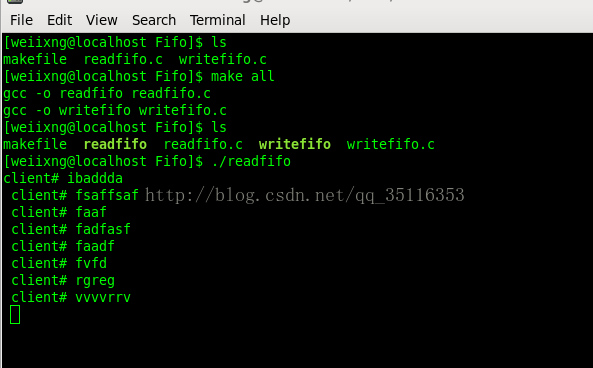
感谢阅读,希望能帮助到大家,谢谢大家对本站的支持!
原文链接:http://blog.csdn.net/qq_35116353/article/details/59117339
1.本站遵循行业规范,任何转载的稿件都会明确标注作者和来源;2.本站的原创文章,请转载时务必注明文章作者和来源,不尊重原创的行为我们将追究责任;3.作者投稿可能会经我们编辑修改或补充。





